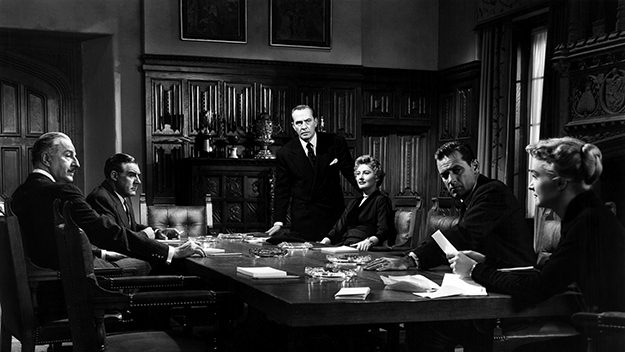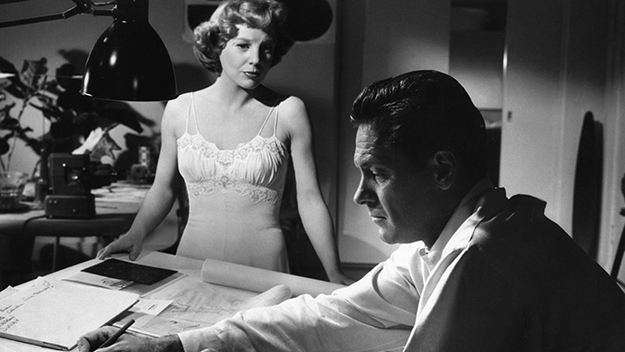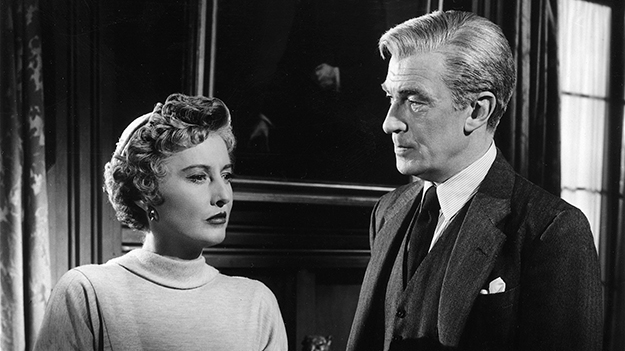TCM Diary: Executive Suite

All images from Executive Suite (Robert Wise, 1954)
Let other movies start with a bang. Executive Suite (1954) begins with a “bong.” Over a series of office tower beauty shots, newscaster Chet Huntley’s uncredited voice insists that the white collar sanctums within are stocked with people just like us. “You may think that those that work there are somehow above and beyond the tensions and temptations of the lower floors,” Huntley says. “This is to say that it isn’t so!” Hammering the point home, a deep church bell intones in time with zooming-out credits naming William Holden, June Allyson, Fredric March, Barbara Stanwyck, Paul Douglas, and the rest of the film’s murderers’ row of mid-’50s stars and character players.
The behind-the-scenes star power driving Executive Suite is just as formidable. Producer John Houseman spent months coordinating his in-demand cast’s availability while assembling a team of MGM A-listers (including a Vincente Minnelli favorite, cinematographer George Folsey) along with a handful of outside hires. Chief among these was director Robert Wise. Since leaving RKO, where he edited Citizen Kane and made his directing debut for producer Val Lewton, Wise had ascended the ladder at 20th Century Fox thanks to a no-nonsense adherence to schedule and budget, and seemingly infinite patience with onscreen talent.
Largely un-tested screenwriter Ernest Lehman (who went on to write North by Northwest) got the gig condensing Cameron Hawley’s 300 pages of bestselling prose. Lehman took full advantage of Hawley’s structural thrift (the novel’s roughly day-and-a-half time frame is time- and location-stamped throughout the book) while loosening up Hawley’s labored language. The para-Shakespearean corporate power struggle that is the main plot of both novel and film begins with the sudden fatal stroke of Tredway Corporation magnate Avery Bullard. Hawley’s death scene for Bullard unfolds thus: “A whiplash or pain exploded behind his eyes. Instantly, a giant force was twisting his head to the right until it seemed that the cords of his neck were being torn from his shoulders, disembodying his brain, washing it through the whirlpool of crimson flood and then into the engulfing blackness of a silent cave.” In the film, Lehman, Wise, Folsey, and an anonymous pair of arms enact Bullard’s last moments and curbside demise as series of real-time, uninterrupted, first-person POV tracking shots. It’s a wonderfully loopy piece of filmmaking that straps the audience into the narrative driver’s seat right up to and including Bullard’s swoon to black.

Thanks to a postmortem pocket-picking, Bullard’s body goes unidentified by police and unreported at Tredway corporate HQ back home in Pennsylvania. George Caswell (Louis Calhern at his most louche), however, happens to see Bullard die from the window of his office. A major Tredway shareholder, Caswell stays mum about Bullard’s death to finagle a short sale of his Tredway stock, anticipating a Monday first-bell price plunge (Bullard died at end-of-business Friday) when the boardroom power vacuum becomes public knowledge. As the clock ticks toward a board meeting in which the furniture company’s fate will be decided, we meet the rest of the deep speaking-part bench of executives, stockholders, board members, spouses, secretaries, and those “lower floor” employees name-checked in the intro, and we learn the various positions, rivalries, and vulnerabilities handicapping the succession odds to the Tredway throne. Ultimately it comes down to Mac Walling (Holden)—eager to take the company into a future that’s bright for shareholder and employee alike—versus Loren Shaw (March), an unctuous bean counter who would strand the Tredway ship of commerce on the rocky shoals of conscienceless profit.
It all climaxes in a boardroom exchange of ballots, bluster, and bromides. But Wise, Lehman, and company put off that inevitable confrontation for as long as possible. Much of the film’s pleasures comes from a generous peppering of two character scenes that add color and nimbly detail the stakes and allegiances that will play out in the big confrontation to come. A pair of cops shoots the breeze over Bullard’s still unidentified personal effects in a gleefully cynical update on Hamlet’s gravediggers. A two-hander between Mac and Bullard’s scorned mistress Julia Tredway (Stanwyck) veers into gothic territory.

“Executive Suite, a talkie in every sense of the word, had a chance to be a very static picture,” the film’s editor, Ralph E. Winters, wrote in his memoir. Like fellow cutting-room graduates Don Siegel, Terence Fisher, and David Lean, Wise’s command over nuts-and-bolts scene geography is effortlessly lucid. Breaking down the finale of Executive Suite, or any table-set scene elsewhere in Wise’s filmography (a contentious missionary dinner scene in The Sand Pebbles, for instance) yields a primer in how to liven up and clarify what could otherwise be a potentially dull and confusing combination of talking heads. “Bob Wise knew exactly what he needed in the way of angles in order for a scene to be cut properly,” Winters wrote. “Thinking and knowing that movement of the camera would keep the picture from having a static feel, [Wise] had the camera moving whenever he could.”
Wise’s career-long refusal to tailor specific film material to his own general aesthetics likely cost him the auteur appeal of far less prolific fellow RKO alums like Lewton, Nicholas Ray, Jacques Tourneur, and Orson Welles. But could Executive Suite perhaps contain smuggled confessional personal history from Wise’s RKO days? His ascent to the director’s chair was, after all, made at the behest of management and at the expense of two trusted colleagues. Wise infamously recut and partially reshot Welles’s Magnificent Ambersons under front-office orders, and then replaced behind-schedule Curse of the Cat People director Gunther von Fritsch outright for his first “Directed by Robert Wise” credit.
“Well, Bob, he’s not going to be there Monday morning directing the film,” RKO B-unit boss Sid Rogell once told Wise when he balked at helping kick Fritsch to the directorial curb. “Could be you, could be somebody else, but he’s not going to be there. What do you say?” Mac Walling would’ve told Rogell, as he tells Loren Shaw in Executive Suite, to take a hike. Management has no right to “ask a man to do anything that will poison his pride in himself or his work.” Robert Wise said yes. Was Executive Suite his mea culpa?
Executive Suite plays on TCM on August 28.
Bruce Bennett is a TV writer and producer and recovering film critic based in Woodside, NY.







